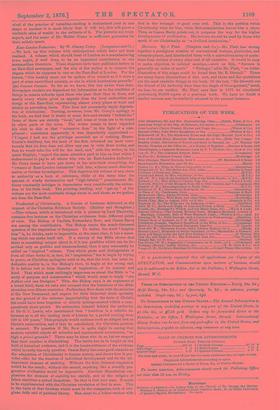Credentials of Christianity. A Course of Lectures delivered at the
request of the Christian Evidence Society. (Hodder and Stoughton.) —This volume, which is introduced with a preface by Lord Harrowby, contains five lectures on the Christian evidences from different points of view. The Bishop of Carlisle, Prebendary Row, and Canon Barry are among the contributors. The Bishop treats the much-discussed question of the inspiration of Scripture. To define the word " inspira- tion" is, he thinks, next to impossible, at the same time, it has a mean- ing which can make itself felt. If a survey of the Bible shows that there is something unique about it, if it has qualities which can be de- scribed only as godlike and transcendental, then it may reasonably be called an " inspired " volume. That which parts and distinguishes it from all other books is, in fact, its inspiration," but to begin by trying to prove, as Christian apologists used to do, that the book has some in- definable quality is, in the Bishop's view, to begin at the wrong end. It is labour lost to form theories of inspiration, of its manner and kind. That which most strikingly impresses us about the Bible is " a unity of purpose and construction" which would seem to imply "one Author and one Designer." This, the Bishop says, is an argument of a broad kind, when we take into account that the literature of the Bible stretches over fifteen centuries. Prebendary Row deals with the miracles of the New Testament, and argues for their historical truth specially on the ground of the extreme improbability that the facts of Christ's life could have been forgotten or utterly misrepresented within a com- paratively short period. He entrenches himself behind the authority of Sir G. C. Lewis, who maintained that " tradition is a reliable in- formant as to all the loading facts of history for a period varying from 100 to 120 years." This principle would embrace such an alleged fact as Christ's resurrection, and if that be established, the Christian position is secured. We question if Mr. Row is quite right in saying that modern unbelief rejects all miracles and supernatural occurrences, "on high a priori grounds." There may be those who do so, but we suspect that their number is diminishing. The battle has to be fought on the field of historical evidence, and it is the trustworthiness of the evidence which is really the only question. Canon Barry has some good remarks on the adaptation of Christianity to human society, and shows how it pro- vides alike for the freedom of individual development and for the all- important element of stability. Without the first, Oriental stagnation would be the result ; without the second, anything like a steadily pro- gressive civilisation would be impossible. Absolute Monotheism em- phasises the element of stability too sternly, and so the religion of Islam sanctions a naked despotism. Its idea is God over man. It needs to be supplemented with the Christian revelation of God in man. This IS the basis of that freedom which must be the companion both of reli- gious faith and of political liberty. Man must be a fellow-worker with
God in the triumph of good over evil. This is the position which Christianity wins for him, while Mahommedanism leaves him a slave. Thus, as Canon Barry points out, it prepares the way for the higher developments of civilisation. His lecture should be read by those who speak of our Christianity as "a civilised heathenism."


































 Previous page
Previous page